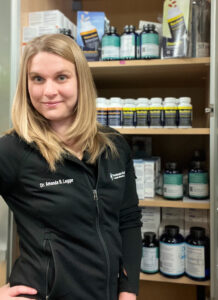
Dr. Legge in her office with her display cabinet of nutraceuticals. Dr. Legge says LifeMeter from MacuHealth has made a huge difference to her ability to educate patients and quantify the need for carotenoid supplements.
A new way to measure carotenoid levels and provide patients with nutraceutical solutions.
Sponsored Content
By Amanda S. Legge, OD
Oct. 25, 2023
The more we learn about the impact of nutrition on eye health, the more we realize how essential it is to encourage a healthful diet and prescribe supplements when necessary. The nutrition education we provide is aided greatly in our practice by the use of a new device from MacuHealth, LifeMeter, which gives us a way to measure carotenoid concentration levels and quantify the need for nutraceutical help.
A Tool & Supplement with Wide Application
Across the six doctors in our practice, we have prescribed MacuHealth for at least several hundred patients. The vast majority purchase through our office, and I would estimate that 80 percent of patients remain compliant with it throughout a one-year time period.
Having LifeMeter in our practice aids compliance and has significantly boosted the number of patients purchasing MacuHealth specifically rather than price-shopping for another over-the-counter product. We expect our patients’ use of MacuHealth to continue to grow steadily.
We also use other products, in addition to MacuHealth, to aid our patients’ nutrition. LifeMeter has improved the profit of all our nutraceutical sales that include carotenoids.
Show Patients Objective, Individualized Findings Backing Use of Nutraceuticals
The biggest difference in my discussion since adding LifeMeter is the concrete value of carotenoid intake that I am now able to show each individual. While previously I discussed the importance of healthy diet, lifestyle and exercise, it was more of a broad discussion as to why this is important for everyone. Some patients identified with this while others had difficulty making the connection to themselves personally since they thought and felt that they were eating and living healthily.
Having LifeMeter in our practice shows patients how good their actual carotenoid intake is, no matter how subjectively well they think they are eating. So, we have gone from a global discussion to an individualized one per patient. I am able to explain why I am concerned about their unique unmet nutrition needs.
LifeMeter also makes it easy for us to prove that MacuHealth is working for them when they come back to re-test in three months, as we recommend. In addition, for those patients who did price-shop and purchase a lutein supplement elsewhere, we can find out, and show them, if that chosen supplement is working (in my personal experience, almost no one has reached appropriate carotenoid levels by price-shopping nutraceuticals). I can now explain more directly in why I recommend the products I do.
Have the Conversation with Patients
I recommend carotenoid supplementation for those who are at risk of AMD, have drusen, or a diagnosis of AMD with low carotenoid levels. If patients do not have risk for or have AMD, I use LifeMeter to discuss general healthy diet and lifestyle decisions. Even for those at risk of, or with AMD, I always discuss the importance of healthy diet because you cannot supplement your way out of a poor diet.
My typical discussion when recommending supplementation goes something like this:
“Carotenoids are pigments found in plants. As humans, we do not produce our own supply of carotenoids, we only ingest them through diet – specifically through vegetables and less so fruits.
Carotenoids are powerful antioxidants and an excess of them is stored in our retina, specifically our macula, and can improve contrast sensitivity and glare disability. If we have healthy nutrition and carotenoid intake over the long-term, it reduces our risk of developing AMD.”
I then recommend supplementation. I tell patients, “If your doctor starts you on a cholesterol medication, they will order bloodwork to confirm you are meeting your goals. We will do the same by monitoring your carotenoid levels with our LifeMeter device.”
I am not recommending carotenoid supplementation to diabetics to aid that particular condition, but having a low carotenoid value begs the question, “If you aren’t eating a lot of vegetables, what are you eating instead?” That question has led to meaningful conversations with all patients.
A good diet is hard to achieve and maintain over a lifetime, and supplementation can play an important role when a patient has a hard time hitting their nutrition goals with diet alone. MacuHealth, aided by the power of LifeMeter, is able to show patients how much they have to gain with the right nutraceutical help.
 Amanda S. Legge, OD, practices with Wyomissing Optometric Center, which has three locations in the Reading, Penn., area. To contact her: drlegge@wyoopto.com
Amanda S. Legge, OD, practices with Wyomissing Optometric Center, which has three locations in the Reading, Penn., area. To contact her: drlegge@wyoopto.com

























